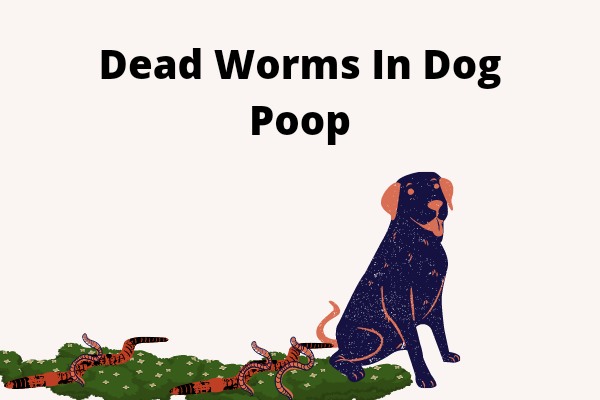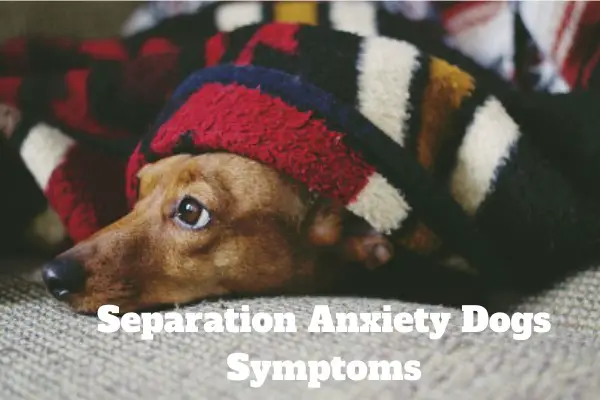Dead Worms In Dog Poop: 6 Simple Reasons

Dog owners always wonder what dead worms in dog poop meant, after reading this post, you will understand the meaning of dead worms in dog poop.
Worms in dog poop can be a sign of several different illnesses including dietary, parasitic, and bacterial.
Many pet owners don’t know the signs of worm problems in case their dog ever has them.
You might be wondering what is the significance of dead worms in dog poop, but it’s actually very important.
Dogs are one of the most commonly kept pets in many homes, and they typically do their business outside, which is where you will find their poop.
Dead worms found in dog feces are not an uncommon occurrence. It’s also not something that should be ignored, as this could indicate a major health problem for your pet.
What causes dead worms in dog poop? And why does it happen? Let’s find out!
Dead Worms In Dog Poop
Dead worms in dog poop mostly occur after deworming a dog or a worm treatment, which also means the worms are dead and no longer living inside a dog intestine, dead worms in dog poop may show a dog have diarrhea due to ingests feces with dead worms.
Have you ever seen a dead worm in your dog’s poop? Well, if so, it could be due to a number of things.
One of the most common reasons is that your pet ate too many raw or undercooked eggs.
Other causes can include eating fruits and vegetables with high levels of vitamin A, intestinal parasites, and cysts from tapeworms.
In addition to these medical reasons, there may also be behavioral reasons for having worms in your dog’s poop.
Dogs sometimes eat their poop because they are bored and lack stimulation, or because they have anxiety and feel relief when they do.
If this is the case for you and your dog, there are ways to make life more stimulating for them and reduce their anxiety, such as increasing exercise.
Let’s take a deep dive into what causes dead worms in dog poop.
Also, read about how dogs get worms.
Reasons of dead worms in dog poop
With the arrival of spring and summer, many dog owners in the Northern Hemisphere will soon be dealing with worms in their pup’s poop.
Parasitic worms can be found throughout the year, but they are more likely to flourish when the weather is warm and damp.
Here are the common reasons why you can find dead worms in dog poop:
Effective worm treatment
Intestinal worms in dogs that have been treated may begin to show up in their stools.
It’s quite common to see dead worms in your dog’s poop after he’s done his business.
It’s an indication that your dog is getting better from the worms.
The parasites in your dog’s system are usually killed by most deworming medicines.
The end of a worm lifecycle
Following the death of worms, the worms move naturally through your dog’s digestive tract, where you may find the dead worms in dog feces.
Most worms lose their capacity to resist digestion by the mammalian host after being exposed to praziquantel.
In many cases, only partially digested and destroyed worms fragments can be found in the feces.
The majority of tapeworms are digested and do not pass through the intestines.
Shows ineffective worm treatment
If you discover dead worms in your dog’s excrement after a week or longer, or even live worms, it’s time to call your veterinarian again.
Your dog may still be infected with worms and require further treatment or a different type of dewormer to be free of them.
Because not all dewormers work on all types of parasitic worms, your veterinarian may need to prescribe a different one.
The dog is passing a message telling its sick
Even without treatment, dogs can still pass dead worms in their poop, I have seen these conditions over and over again.
When you see your dog passing dead worms in poop, don’t overlook it, because your dog is sending you a message of its sick condition.
So, take your dog to the vet if you get this fantastic message from your buddy, and don’t ignore it.
Remember, dogs can have worms without showing any signs for a while, so always visit where your dog poop and check for worm signs.
It may be signs of dog still fighting worms
Depending on the type of worms involved, dogs have an internal way of fighting always developed to kill worms.
Some worms are more deadly than others and may have less effect on a dog’s daily routine.
If you see a dead poop it’s a clear sign your dog is fighting or dealing with worms, and you should help your dog win the fight by visiting the veterinary.
Dead worms in dog poop are making diagnosis easy
If you see worms in your dog poop, do you still need any further diagnosis to prove your dog has worms? The answer is no.
The only diagnosis you need is to figure out what type of worm is infesting your dog, this is done by a veterinarian.
Therefore, seeing dead or living worms in your dog poop has made the diagnosis of worm easy.
This takes us to another topic which is how to diagnose worms in dogs.
How to diagnose worms in dogs
While tapeworms may be seen in the stool of a dog, other types of intestinal worms are usually discovered by microscopically analyzing eggs in a stool sample.
If your cat or dog exhibits any of the symptoms, your veterinarian will request a stool sample.
Even if your cat or dog exhibits no indications of disease, taking a sample of his excrement to your veterinarian for an annual examination is a smart idea.
Heartworms are usually detected by a blood test. In rare cases, a radiograph, ultrasonography, or echocardiogram may be required.
To treat various forms of intestinal parasites and heartworms, your veterinarian may prescribe deworming medications as well as preventative therapies.
Find out if your dog can get worms from cats in this article.
Dead worms in dog poop after deworming
You may notice worms in your dog’s stool or even vomit when deworming medicine is administered to a dog with a worm infestation.
This is a natural reaction that involves your dog’s intestines or body eliminating the dead worms.
Dead worms in dog poop after deworming simply means the whole deworming medication was effective, and your dog is getting rid of the worms from its system.
But if the worms are still alive in your dog’s poop, you need to see the vet again.
Find out the 7 easy ways humans can get worms from dogs.
When to deworm a dog
Dog puppies must be wormed on a regular basis, usually until they are six months old; seek guidance from your veterinarian on the best way to use their products.
Adult dogs should be dewormed at least four times per year, and more regularly if there are young children in the home.
Females must also be wormed when they are pregnant, nursing puppies or 30 days after a season has ended.
Always seek your veterinarian’s advice on worming schedules and frequency.
It’s also critical to constantly clean up after your dog and dispose of feces, particularly in your own garden, where egg numbers can quickly accumulate.
Find out how humans can get worms from cats.
Types of worms that attack dogs
Here are some common types of worms found in worms:
Tapeworms
Tapeworms reside in the small intestine, where they use six tiny rows of teeth to grip onto the wall and collect nutrients when food is processed.
They are long and flat, measuring half a foot or more in length.
The parasite does not damage the dog unless it is highly active since there are enough resources to feed both the host and the tapeworm.
The worm typically divides into pieces that resemble tiny grains of rice when expelled.
Whipworms
Whipworms live in the area where the small and big intestines meet. Here, they consume their hosts’ blood.
Dogs might take them up from contaminated soil or during grooming.
Whipworms can cause bloody diarrhea if they are lodged in large numbers in the stomach.
Certain heartworm preventives can be used to treat whipworms, and whipworms can be treated with an oral dewormer.
Roundworms
Toxocara canis and Toxascaris leonin are two kinds of roundworms that can infect dogs.
Both are long, white, and spaghetti-like, and they suck nutrition from the sick dog.
Roundworm larvae will infect a dog’s digestive system first, but they can burrow their way into other body tissues and organs as well.
Toxocara canis larvae mature by moving onto the lungs to grow, then up to the airway before being coughed up and ingested again, returning to the gut to finish their lifespan.
Toxascaris leonina has a simpler lifecycle and does not migrate throughout the body.
Hookworms
Hookworms in dogs are the smallest of all the worms that may be detected in dogs. Hookworms are most commonly seen in dogs’ small intestines.
They reach a length of approximately an inch and feed on human blood. It can cause life-threatening anemia in dogs of all ages, but especially puppies.
Hookworms are parasitic worms that are spread by feces and may infect both animals and humans.
Heartworms
Heartworms are the most dangerous worms in dogs, and they’re also the easiest to prevent.
Because preventing mosquito bites is virtually difficult in most locations, veterinarians suggest frequent heartworm preventatives keep your dog safe.
If left untreated, heartworms proliferate and reproduce within the heart, causing serious lung illness, heart failure, and other organ damage, as well as death.
Read more about worms:

![What Do Great Pyrenees Die From [9 Hints] What Do Great Pyrenees Die From](https://petcreeks.com/wp-content/uploads/2023/04/What-Do-Great-Pyrenees-Die-From-768x555.jpg)


![Eye Trauma in Dogs [Signs, Causes & More] Eye Trauma in Dogs](https://petcreeks.com/wp-content/uploads/2023/10/pexels-cynthia-vh-1572849.jpg)
![Are Seizures Common in Beagles [Causes, Signs & Treatments] Are Seizures Common In Beagles](https://petcreeks.com/wp-content/uploads/2021/04/Are-Seizures-Common-In-Beagles.jpg)
